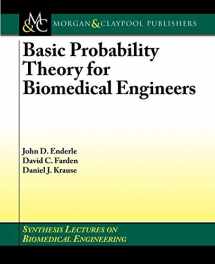
Basic Probability Theory for Biomedical Engineers (Synthesis Lectures on Biomedical Engineering, 5)
Book details
Summary
Description
This is the first in a series of short books on probability theory and random processes for biomedical engineers. This text is written as an introduction to probability theory. The goal was to prepare students, engineers and scientists at all levels of background and experience for the application of this theory to a wide variety of problems—as well as pursue these topics at a more advanced level. The approach is to present a unified treatment of the subject. There are only a few key concepts involved in the basic theory of probability theory. These key concepts are all presented in the first chapter. The second chapter introduces the topic of random variables. Later chapters simply expand upon these key ideas and extend the range of application. A considerable effort has been made to develop the theory in a logical manner—developing special mathematical skills as needed. The mathematical background required of the reader is basic knowledge of differential calculus. Every effort has been made to be consistent with commonly used notation and terminology—both within the engineering community as well as the probability and statistics literature. Biomedical engineering examples are introduced throughout the text and a large number of self-study problems are available for the reader.


We would LOVE it if you could help us and other readers by reviewing the book
Book review



